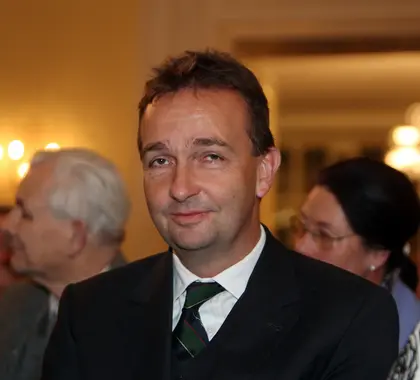“I look at it from an academic point of view,” he said with a smile. “It had nothing to with me.”
Despite his easy manner, however, von Habsburg evidently has no intention of letting the past, particularly his ancestors’ role, remain lifeless in history books. Nearly a century after the Habsburg monarchy’s rule ended in Europe, he is dedicating himself to ensure its legacy lives on in western Ukraine.
JOIN US ON TELEGRAM
Follow our coverage of the war on the @Kyivpost_official.
The 49-year-old von Habsburg was in Lviv in March to announce the creation of a foundation that carries his family’s name. Based in Ivano-Frankivsk, the Habsburg Foundation will promote and preserve the cultural legacy that for centuries shaped and gave Central and Eastern Europe its identity.
Along with translating books about the Habsburgs, the foundation is also planning to create the Halychyna Award, a prize that will honor individuals who promote the region’s culture through art, books or media.
While the foundation is still in its infancy, von Habsburg says its mission is vital.
“In this area, we need to do something about keeping the heritage alive, the history and the intellectual history. Authors came here because they got their inspiration here,” he told the Kyiv Post in an interview.
“In Ukraine and in the rest of Europe, they forget to see what an incredible center Galicia was,” von Habsburg said, referring to the region which today incorporates part of Poland and most of western Ukraine. “There was the Jewish element, which was destroyed under the German occupation. … People are astoundingly polyglot here.”
At the turn of the twentieth century, the Austro-Hungarian Empire – which gave Central and Eastern Europe much of its art, culture and architecture – spanned from Ukraine’s Carpathian Mountains, down to the Adriatic Sea in the south. It encompassed more that twelve European peoples and its monarchy, the Habsburgs, had enjoyed over six centuries of uninterrupted power.
A recent book by renowned historian Timothy Snyder chronicles the life of Wilhelm von Habsburg, the member of the Habsburg family who was closest aligned with Ukrainians. Titled The Red Prince, it brought renewed attention to the family’s connections with the region.
Better known as Vasyl Vashyvaniy, Wilhelm was the younger son of Archduke Karl Stephan, who was in line to eventually become King of Poland. In a bid to save his crumbling world, in 1916, Emperor Franz Josef I, along with his German counterpart, had created a Polish kingdom as an independent state with a hereditary monarchy.

Vasyl Vashyvaniy
Wilhelm, however, had his own goal: He wanted to establish a monarchy on the territory of what is today’s western Ukraine. Snyder writes that the idea was well-received, particularly among some Ukrainian military leaders and the Church.
A military officer by training, Wilhelm supported Ukraine’s independence struggle during World War I. He fought with Ukrainian troops against the Russians, and had schemed and cajoled a myriad of politicians to support his monarchial aspirations. Almost until his death at the hands of the Soviets in 1948 – he was snatched off the streets of Vienna and transported to a prison in Kyiv for working as an agent against the Soviet Union – Wilhelm believed this slice of the family’s empire could be his.
Although Wilhelm remains a lesser known figure in history books, von Hapsburg said he is aware of the role he played both within the family’s and Ukraine’s history.
“I knew about his existence and I know of the important political dimension,” von Habsburg said. “I read [Snyder’s book] and kept asking my father, ‘Is this true?’”
Von Habsburg’s father is Otto, the former Crown Prince. He relinquished the role of head of the family to his son in 2007. A well-regarded former member of the European parliament and a prominent historian, Otto has visited Ukraine on several occasions.

Otto von Habsburg
The Habsburg era has undergone somewhat of a renaissance lately in western Ukraine; the new foundation is just the latest in that trend. A conference held late last year brought scholars from around the country to Chernivtsi, which along with Lviv was considered an important city in the region. A Ukrainian-language book on Wilhelm titled The Ukrainian Patriot from the Habsburg Dynasty was published in 2008. It outlines not only his biography, but also contains archival documents and Wilhelm’s correspondence with Ukrainian military and religious leaders.
Yet as much as his family’s legacy may be making a comeback in Ukraine, the Habsburgs have had a harder time in Austria, von Habsburg said. Otto was only allowed to return to Austria in the early 1960s after renouncing claims to the throne.
Still, von Habsburg and his relatives remain politically active. Von Habsburg was once a member of the European parliament, while others currently hold posts there. One relative even became a citizen of Georgia and is her new country’s ambassador in Germany.
“It’s a family that hasn’t focused on just one part of the world,” von Habsburg said.
Natalia A. Feduschak is the Kyiv Post’s correspondent in western Ukraine. She can be reached at [email protected].
You can also highlight the text and press Ctrl + Enter




